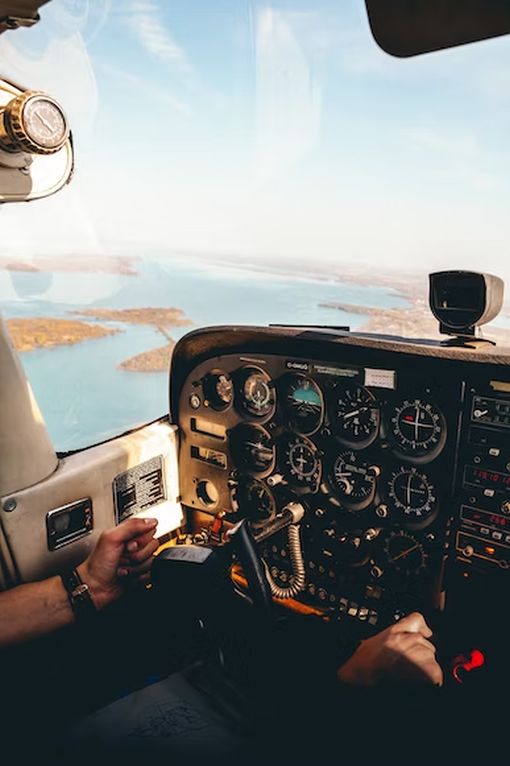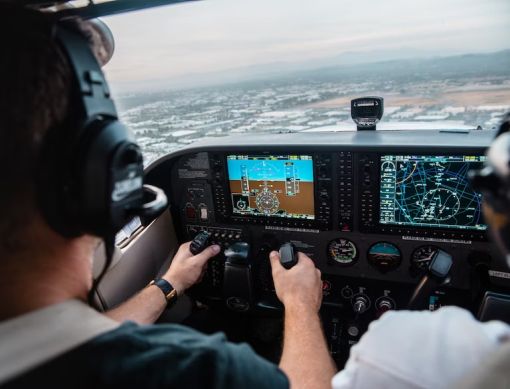The Wings of Success: Helpful Tips On How to Pursue a Career as a Pilot
Becoming a pilot is a dream for many individuals who are captivated by the magic of flight. It’s a career that offers exhilaration, adventure, and the opportunity to travel the world. However, the path to becoming a pilot requires dedication, perseverance, and a passion for aviation. In this article, we will explore the essential tips and steps to help you pursue a career as a pilot, from the initial training to reaching the skies.

Choose the Right Flight Training Program:
The first step towards a career as a pilot is to choose the right flight training program. It’s crucial to select a reputable flight school that offers comprehensive training of various duration times and adheres to strict safety standards. Look for schools that are accredited by aviation authorities and have experienced instructors. Take the time to research and compare different programs to find the one that aligns with your goals and budget.
Flight training programs typically consist of ground school and flight training. Ground school covers subjects like aviation regulations, meteorology, aircraft systems, navigation, and aerodynamics. It lays the foundation of knowledge required for a successful pilot. Flight training involves hands-on experience in the cockpit, where you’ll learn how to handle the aircraft, perform maneuvers, and navigate different flight scenarios. It’s important to find a program that provides a balance between theoretical knowledge and practical experience.
Obtain the Necessary Licenses and Certificates:
To pursue a career as a pilot, you need to obtain the necessary licenses and certificates. The most common license is the Private Pilot License (PPL), which allows you to fly for recreational purposes. However, if you aim to become a professional pilot, you’ll need to obtain a Commercial Pilot License (CPL). The CPL enables you to fly for compensation or hire, opening doors to various aviation career opportunities.
In addition to the CPL, you’ll also need an Instrument Rating (IR), which allows you to fly in conditions of reduced visibility using only the aircraft’s instruments. This rating is essential for operating in adverse weather conditions or during nighttime flights. Depending on your career aspirations, you may also pursue additional certifications such as a Multi-Engine Rating (MER), which qualifies you to fly aircraft with multiple engines.
Gain Flight Experience and Build Hours:
Building flight experience is a crucial step in your journey to becoming a professional pilot. Most airlines and aviation companies require a certain number of flight hours before considering you for employment. As a newly licensed pilot, you can accumulate flight hours by becoming a flight instructor, joining a charter company, or participating in aerial surveying and photography.
Another popular option is to join regional airlines as a first officer. Although the pay may not be as high as at major airlines, it provides an excellent opportunity to gain valuable experience and log flight hours. Building a robust flight experience not only enhances your skills but also demonstrates your commitment and dedication to potential employers.
Network and Stay Updated:
Networking plays a crucial role in the aviation industry. Attend aviation conferences, airshows, and industry events to connect with professionals and stay updated on the latest trends. Building relationships with individuals in the aviation community can open doors to job opportunities and valuable mentorship. Additionally, stay updated with advancements in aviation technology, regulations, and industry news. Subscribe to aviation magazines, follow influential aviation blogs, and join online communities to stay informed and expand your knowledge base.
Embrace Continuous Learning and Professional Development:
Becoming a pilot is not just about obtaining licenses and certificates; it’s a lifelong journey of continuous learning and professional development. Aviation is an ever-evolving industry, with advancements in technology, regulations, and safety protocols. To stay ahead and maintain a competitive edge, it’s crucial to embrace continuous learning.
Consider pursuing advanced certifications and ratings to enhance your skills and expand your career options. For example, obtaining an Airline Transport Pilot License (ATPL) is the highest level of pilot certification and allows you to operate as a captain on large commercial aircraft. Additionally, specialized training in areas such as aerobatics, flight instructing, or corporate aviation can set you apart and open doors to unique aviation opportunities.
Furthermore, attend seminars, workshops, and industry conferences to stay updated on the latest developments and best practices in aviation. Engage in self-study, read aviation publications, and participate in online forums and discussions to deepen your understanding of the industry. By embracing continuous learning and professional development, you’ll demonstrate your commitment to excellence and position yourself for long-term success.
Embrace Continuous Learning and Professional Development:
Becoming a pilot is not just about obtaining licenses and certificates; it’s a lifelong journey of continuous learning and professional development. Aviation is an ever-evolving industry, with advancements in technology, regulations, and safety protocols. To stay ahead and maintain a competitive edge, it’s crucial to embrace continuous learning.
Consider pursuing advanced certifications and ratings to enhance your skills and expand your career options. For example, obtaining an Airline Transport Pilot License (ATPL) is the highest level of pilot certification and allows you to operate as a captain on large commercial aircraft. Additionally, specialized training in areas such as aerobatics, flight instructing, or corporate aviation can set you apart and open doors to unique aviation opportunities.
Furthermore, attend seminars, workshops, and industry conferences to stay updated on the latest developments and best practices in aviation. Engage in self-study, read aviation publications, and participate in online forums and discussions to deepen your understanding of the industry. By embracing continuous learning and professional development, you’ll demonstrate your commitment to excellence and position yourself for long-term success.
Cultivate Essential Skills and Qualities:
While technical knowledge and flying skills are essential, cultivating certain skills and qualities can greatly enhance your prospects as a pilot. These skills include strong communication abilities, decision-making under pressure, problem-solving, and teamwork. As a pilot, you’ll often work as part of a crew, and effective communication is vital for safe and efficient operations.
Additionally, develop your situational awareness, which involves being fully aware of your surroundings, anticipating potential hazards, and making informed decisions. Enhance your ability to analyze complex situations, prioritize tasks, and make quick and accurate judgments. These qualities are highly valued in the aviation industry and contribute to your effectiveness as a pilot.
Furthermore, cultivate professionalism and a strong work ethic. Demonstrate punctuality, discipline, and a commitment to safety at all times. Develop leadership skills and the ability to remain calm and composed in high-stress situations. By focusing on both technical skills and personal qualities, you’ll become a well-rounded and respected pilot in the industry.

Pursuing a career as a pilot is an exciting and rewarding journey. By choosing the right training program, obtaining the necessary licenses, building flight experience, networking, embracing continuous learning, and cultivating essential skills, you can set yourself on the path to success. Remember, becoming a pilot requires dedication, perseverance, and a lifelong passion for aviation. With each step you take, you’ll be one step closer to reaching the skies and living your dream as a pilot.
